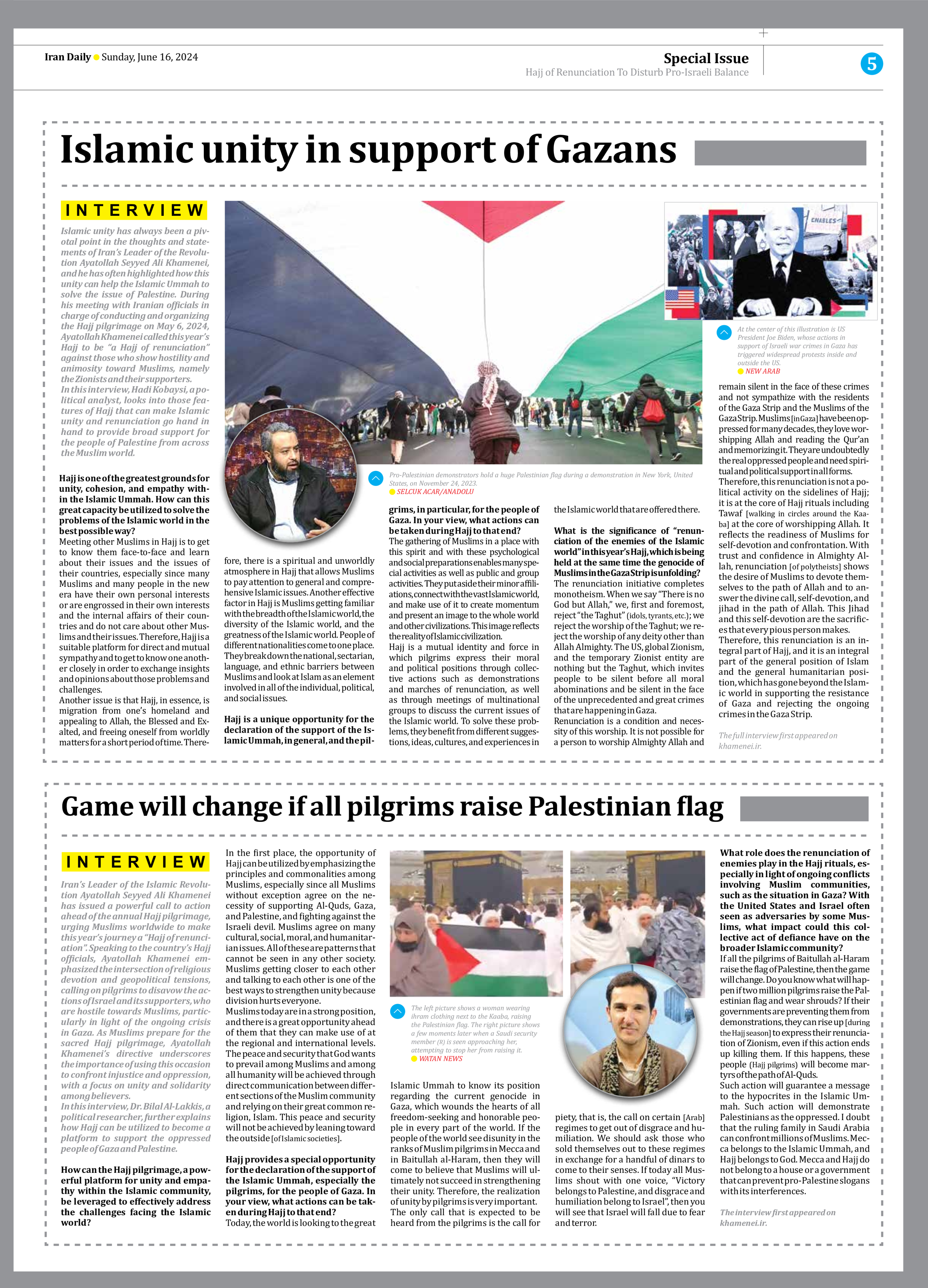
Islamic unity in support of Gazans
Islamic unity has always been a pivotal point in the thoughts and statements of Iran’s Leader of the Revolution Ayatollah Seyyed Ali Khamenei, and he has often highlighted how this unity can help the Islamic Ummah to solve the issue of Palestine. During his meeting with Iranian officials in charge of conducting and organizing the Hajj pilgrimage on May 6, 2024, Ayatollah Khamenei called this year’s Hajj to be “a Hajj of renunciation” against those who show hostility and animosity toward Muslims, namely the Zionists and their supporters. In this interview, Hadi Kobaysi, a political analyst, looks into those features of Hajj that can make Islamic unity and renunciation go hand in hand to provide broad support for the people of Palestine from across the Muslim world.
Hajj is one of the greatest grounds for unity, cohesion, and empathy within the Islamic Ummah. How can this great capacity be utilized to solve the problems of the Islamic world in the best possible way?
Meeting other Muslims in Hajj is to get to know them face-to-face and learn about their issues and the issues of their countries, especially since many Muslims and many people in the new era have their own personal interests or are engrossed in their own interests and the internal affairs of their countries and do not care about other Muslims and their issues. Therefore, Hajj is a suitable platform for direct and mutual sympathy and to get to know one another closely in order to exchange insights and opinions about those problems and challenges.
Another issue is that Hajj, in essence, is migration from one’s homeland and appealing to Allah, the Blessed and Exalted, and freeing oneself from worldly matters for a short period of time. Therefore, there is a spiritual and unworldly atmosphere in Hajj that allows Muslims to pay attention to general and comprehensive Islamic issues. Another effective factor in Hajj is Muslims getting familiar with the breadth of the Islamic world, the diversity of the Islamic world, and the greatness of the Islamic world. People of different nationalities come to one place. They break down the national, sectarian, language, and ethnic barriers between Muslims and look at Islam as an element involved in all of the individual, political, and social issues.
Hajj is a unique opportunity for the declaration of the support of the Islamic Ummah, in general, and the pilgrims, in particular, for the people of Gaza. In your view, what actions can be taken during Hajj to that end?
The gathering of Muslims in a place with this spirit and with these psychological and social preparations enables many special activities as well as public and group activities. They put aside their minor affiliations, connect with the vast Islamic world, and make use of it to create momentum and present an image to the whole world and other civilizations. This image reflects the reality of Islamic civilization.
Hajj is a mutual identity and force in which pilgrims express their moral and political positions through collective actions such as demonstrations and marches of renunciation, as well as through meetings of multinational groups to discuss the current issues of the Islamic world. To solve these problems, they benefit from different suggestions, ideas, cultures, and experiences in the Islamic world that are offered there.
What is the significance of “renunciation of the enemies of the Islamic world” in this year’s Hajj, which is being held at the same time the genocide of Muslims in the Gaza Strip is unfolding?
The renunciation initiative completes monotheism. When we say “There is no God but Allah,” we, first and foremost, reject “the Taghut” (idols, tyrants, etc.); we reject the worship of the Taghut; we reject the worship of any deity other than Allah Almighty. The US, global Zionism, and the temporary Zionist entity are nothing but the Taghut, which invites people to be silent before all moral abominations and be silent in the face of the unprecedented and great crimes that are happening in Gaza.
Renunciation is a condition and necessity of this worship. It is not possible for a person to worship Almighty Allah and remain silent in the face of these crimes and not sympathize with the residents of the Gaza Strip and the Muslims of the Gaza Strip. Muslims [in Gaza] have been oppressed for many decades, they love worshipping Allah and reading the Qur’an and memorizing it. They are undoubtedly the real oppressed people and need spiritual and political support in all forms.
Therefore, this renunciation is not a political activity on the sidelines of Hajj; it is at the core of Hajj rituals including Tawaf [walking in circles around the Kaaba] at the core of worshipping Allah. It reflects the readiness of Muslims for self-devotion and confrontation. With trust and confidence in Almighty Allah, renunciation [of polytheists] shows the desire of Muslims to devote themselves to the path of Allah and to answer the divine call, self-devotion, and jihad in the path of Allah. This Jihad and this self-devotion are the sacrifices that every pious person makes.
Therefore, this renunciation is an integral part of Hajj, and it is an integral part of the general position of Islam and the general humanitarian position, which has gone beyond the Islamic world in supporting the resistance of Gaza and rejecting the ongoing crimes in the Gaza Strip.
The full interview first appeared on
khamenei.ir.







